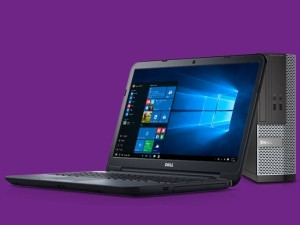
The mammoth Dell-EMC deal has provided great water-cooler fodder over the past week and presents a possible shakeup in the market.
However, not everyone in the industry is equally impressed by the deal, despite its $67 billion price tag, especially when it comes to the future of customers.
Copy data virtualisation company Actifio's CEO Ash Ashutosh says the deal shows the era of the "beautiful box" in enterprise IT is over.
"The acquisition of EMC by Dell clearly marks a turning point in the ever-evolving landscape of enterprise IT. What's less clear is just what we're turning toward," he says.
"Customers are looking for services that help them move faster and more efficiently, and the infrastructure that supports those priorities is more and more a commodity. Dell understands that kind of business well, and will bring those sensibilities to the combined company," according to Ashutosh.
Dell says the deal will create the world's largest privately-controlled, integrated technology company, and the combination "capitalises on the strategic and competitive strengths of each company to create an even stronger company".
Ashutosh sees this type of consolidation as a positive both for companies such as his and for customers.
"This will further reduce the cost of dedicated storage over time, which helps more customers get the value of copy data virtualisation over time."
However, founder of the Real Story Group, Tony Byrne, is not convinced the synergies the two groups will bring as a single entity will be of any use to customers.
"I don't see a future where customers gain anything from procuring Dell servers and EMC storage from the same vendor. EMC and Dell have each failed separately to effectively bundle their manifold offerings already; what makes them think it will more be successful together?" he asks in a recent blog post.
"This buffet-style vision assumes that enterprise IT leaders simply find their world too complicated, and desire a single vendor who can just fix everything for them. This may have been the case in the 1990s, but if so, those days are long gone. The best IT leaders today embrace complexity, and value architectural flexibility over supplier lock-in," says Byrne.
Merger madness
If the deal is approved, it will be the biggest tech-only acquisition so far but certainly not the only one on the cards at the moment.
It comes at a time when there is talk of a possible buyout of SanDisk by Micron Technology and Western Digital, while Alibaba has proposed a $3.5 billion acquisition of Youku Tudou, known as China's YouTube.
At the same time, but in a different sector entirely, AB InBev's proposed $104 billion (R1.4 trillion) offer to buy SABMiller dwarfs all the others.
Byrne believes the Dell-EMC deal has little to do with customers because merger and acquisition deals "often get done because investors see near-term shareholder gains, rather than long-term customer value".
Lise Hagen, IDC research manager for software and IT services for Africa, says this is an example of two second-platform-based compute and software entities that are aspiring to compete in the new non-traditional, third-platform-based world, which are creating an even larger and mostly traditional technological entity.
She defines the second-platform as the client/server system, while the third-platform refers to mobile computing, social media, cloud computing, and big data.
"While such large deals have resulted in technology juggernauts, technology juggernauts are generally challenged by the inherent requirement of agile and fresh thinking required in the third-platform world," says Hagen.
Future M&A
Ashutosh says he is not sure how much consolidation can be expected in future, as different companies have different priorities for their businesses.
"[The Dell-EMC deal] runs counter to HP's 'un-merging', and the rationale there was pretty solid. It seems that businesses powered by economies of scale in mature technologies will need to get bigger; those looking to innovate and differentiate will stay small, nimble, and as close to the customer as possible."
Dell sees the transaction as an opportunity to bring together companies "that have a demonstrated ability to win in fast-changing markets".
"A combined Dell and EMC will be a unique technology company with industry-leading capabilities, complementary solutions and world-class R&D from the desktop to the data centre and the cloud," says Dell.
Hagen says the deal will help Dell to extend its software portfolio and solidify its data centre capabilities but it "follows a tested recipe, and doesn't yet seem to offer anything new to a rapidly evolving market".
Share